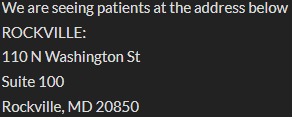Sleep Apnea Management Washington, DC

If you are having a hard time sleeping, it is time to see the Pain Arthritis Relief Center for their trusted sleep apnea management Washington, DC relies on. You may have no idea what is causing you to have difficulty sleeping and if you live alone, you may have no one to tell you that you stop breathing in your sleep. Perhaps you have woken up trying to breathe in more air or you realize you were snoring loudly. Or, you might just wake up feeling like you did not get the sleep you needed at all. When this is the case, you should visit the chiropractors at our office who specialize in Washington, DC sleep apnea management to determine if you are suffering from sleep apnea and to devise a treatment program for you.
What is sleep apnea?
If you leave your chiropractor’s office surprised to hear a diagnosis of sleep apnea, you may wonder what it is. Most people know that someone who suffers from sleep apnea is placed on a CPAP machine while they sleep so they can continue getting air. However, there are other natural alternatives to a CPAP machine like our sleep apnea management program in Washington, DC.
Suffering from sleep apnea means that your airways are restricted and you are not getting enough oxygen when you sleep. When this happens, you will typically wake up gasping for breath. At our office, you can get an x-ray to determine if you have a vertebral subluxation that is causing pressure on your nerves. This can actually cause you to have an obstruction in your airway and cause problems with your breathing. One of the biggest benefits to chiropractic care for your sleep apnea is that it is non-invasive and you do not have to worry about high doses of medication or being cut open to find the answer.
What are the differences between the types of sleep apnea?
When it comes to sleep apnea, we understand that you likely want to know as much as possible about it so that you can treat it quickly and efficiently. There are three types of sleep apnea that we see people suffering from:
- Central Sleep Apnea
- Obstructive Sleep Apnea
- Complex Sleep Apnea
Central Sleep Apnea. Also known as CSA, this type of sleep apnea occurs because your brain is not sending the correct messages to your body. There are muscles that control your breathing and these muscles are not getting the messages to continue breathing. This is not a particularly common type of sleep apnea and usually, it is part of a larger problem that your body may be dealing with. Especially if you are suffering from problems with your spine, you may find that your brain is no longer communicating well with areas of your body.
Obstructive Sleep Apnea. Unlike CSA, obstructive sleep apnea (or OSA) is much more common. This occurs when there is a blockage in your airway as you are sleeping. For most people, their throat muscles naturally relax as they drift off to sleep. This is completely normal. However, when your tongue and other tissues fall back too far into your throat, it can block your airway and cause breathing problems. As air has a hard time getting in, your blood flow also naturally decreases. When this occurs, your brain essentially panics and tries to wake you up so that you can begin breathing again. Thus, if you have ever woken up choking or gasping for air, it was likely a symptom of obstructive sleep apnea.
Complex Sleep Apnea. If you suffer from complex sleep apnea, it means that you have both central sleep apnea and obstructive sleep apnea symptoms. This can make treatment options slightly more complicated.
What can I do when I have a diagnosis?
When you believe that you are suffering from any type of sleep apnea, know that you can come to our office and we will work with you to find a treatment plan that works with you. We understand that this kind of diagnosis can be scary, but remember that knowing what the problem is will be the first step to treating it. We understand that you want a more natural treatment, which is why we will help you make the necessary lifestyle changes.
When it comes to sleep apnea management in Washington, DC, our clinic discusses with patients a number of different options that may be available. In addition to these options, we also like to discuss some of the potential root causes of sleep apnea. This, in turn, can help patients to make an educated decision on what treatments to choose.
The Core Causes of Sleep Apnea
There are two different types of sleep apnea. The most common is called Obstructive Sleep Apnea. This form is dangerous because the person’s breathing becomes blocked, or hindered. As a result, the brain and body become deprived of oxygen. Not only is snoring a result of this blockage, but also cognitive impairments, weight gain, diabetes, and cardiovascular disease can result. Some symptoms of sleep apnea include:
- Headaches
- Sore throat in the morning
- Snoring
- Fatigue
- Restless sleep
As our Washington, DC sleep apnea management doctors might explain to you, blockages in the airways can be related to various factors. One of these is a person’s sleeping position. Furthermore, a majority of sleep apnea sufferers have a misaligned spine. Also known as cervical subluxations, these have been linked to breathing disorders during sleep.
Managing Sleep Apnea with a Focus on the Spine
Sleep can be attributed directly to your health. When your spine is misaligned, you may face difficulties resting, and sleeping. A misaligned spine also causes the central nervous system to be affected particularly because signals cannot transfer from one part of the body to another part of the body. This can lead to a domino-like effect of problems, including sleep apnea. As a chiropractor, we have also seen patients with severe misalignments that can actually induce episodes of sleep apnea. This is because pressure is placed onto the windpipe; thereby, resulting in an airflow obstruction.
Part of our sleep apnea management in Washington, DC focuses on spinal adjustments. These are done to correct the misalignments in the spine. Regardless of how the misalignments have occurred, such as a pinched nerve, sedentary lifestyle, sports injury, or posture, correcting them can restore the nervous system and improve sleep patterns.
Long Term Solutions for Sleep Apnea
Sleep apnea is often treated with a CPAP machine. Although the machine helps with the disorder, it does not fix the condition. A chiropractor can help to absolve the sleep apnea completely. In addition to chiropractic adjustments, our clinic might recommend:
- Dietary changes
- Exercise routines
- Better sleeping positions
- An oral appliance
- + More
If you have been snoring for years, or find yourself unable to get a good night’s rest, it is possible that you have sleep apnea. Let our clinic talk to you about your breathing, snoring, and other symptoms. We can provide you with the tests you need, and create a custom treatment plan that addresses your symptoms. Let us help you get to the bottom of your sleep apnea symptoms through effective sleep apnea management in Washington, DC.
What can I expect from my appointment?
When you come to our office for Washington, DC sleep apnea management, we will take a medical history and conduct a thorough examination. We will want to know how long you have been getting poor sleep, what your symptoms are, and what your lifestyle habits are. We may also decide to do an adjustment at your appointment, so you should come wearing clothes that are comfortable and loose.
Get Help Today
If you are interested in seeing how the Pain Arthritis Relief Center can help with Washington, DC sleep apnea management, please set up your appointment now.





